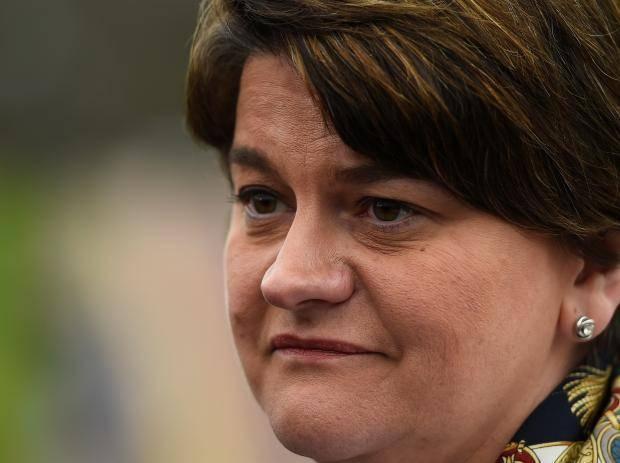Arlene Foster, leader of the DUP, is at her moment of maximum power
The test of her party is how it uses the leverage granted by last year’s election result

Your support helps us to tell the story
From reproductive rights to climate change to Big Tech, The Independent is on the ground when the story is developing. Whether it's investigating the financials of Elon Musk's pro-Trump PAC or producing our latest documentary, 'The A Word', which shines a light on the American women fighting for reproductive rights, we know how important it is to parse out the facts from the messaging.
At such a critical moment in US history, we need reporters on the ground. Your donation allows us to keep sending journalists to speak to both sides of the story.
The Independent is trusted by Americans across the entire political spectrum. And unlike many other quality news outlets, we choose not to lock Americans out of our reporting and analysis with paywalls. We believe quality journalism should be available to everyone, paid for by those who can afford it.
Your support makes all the difference.The Democratic Unionist Party was handed a historic opportunity by accident of arithmetic in last year’s general election. The party lived up to its reputation for hard bargaining by securing significant extra spending on public services in Northern Ireland even though there seemed no prospect that it might switch its support to the opposition Labour Party.
Now, as the prime minister faces the daunting task of trying to get her Brexit deal through parliament, the DUP might be approaching its moment of maximum leverage. All eyes, therefore, were on Arlene Foster, who has led the party for three years, as she addressed its annual conference in Belfast today.
It was a speech, however, that demonstrated the limits of the DUP’s power as well as its strengths. Ms Foster devoted a long section of her speech to an apology for the “ash for cash” scandal from her time before the leadership as minister for enterprise in the Northern Ireland executive. The overhang of this affair threatened her leadership until it was rescued by the unexpected hung parliament after the 2017 election.
Then, when it came to the “momentous” question of Brexit, she said rather less than she had said in interviews before her speech. She said that Theresa May’s deal failed the prime minister’s own “key commitments” and explained why the DUP did not think it was in the “national interest”. But Ms Foster was muted in her opposition, saying at one point “the DUP has never been afraid to say yes”, and that she wanted to “work in the time ahead to secure an improved outcome”.
In an interview yesterday, she said that she did not have a preference between a closer or a more distant post-Brexit relationship with the European Union, as long as Northern Ireland and the rest of the UK were treated the same – something the current deal does not do.
But this is where the DUP may be approaching the limits of its influence. The EU is unlikely to want to reopen Brexit negotiations. Ms May has unexpectedly thrown down the gauntlet to the DUP and has dared its 10 MPs to vote against the deal.
Ms Foster still has one weapon in her armoury. Her MPs could join with the opposition in bringing down Ms May’s government and either installing Jeremy Corbyn as prime minister or, after a 14-day period as required by the Fixed-term Parliaments Act, forcing another general election.
We can see why the DUP would not want a new election, because it would be unlikely to throw up another result that would give them the balance of power. But, in her interview with The Times yesterday, Ms Foster accepted that Ms May’s Brexit deal was a “greater threat” than Mr Corbyn as prime minister. And in her speech she drew attention to her common ground with Mr Corbyn in opposing a regulatory border in the Irish Sea.
It would be an extraordinary turn of events for the DUP to contemplate putting Mr Corbyn in No 10, but the next few weeks will see history being made, one way or the other.
Join our commenting forum
Join thought-provoking conversations, follow other Independent readers and see their replies
Comments